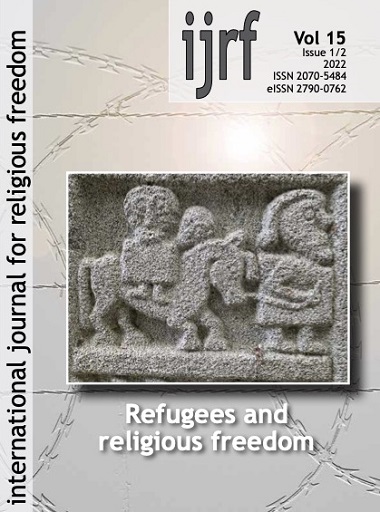 Regent College professor Mark Glanville wrote the lead article for the most recent issue of the International Journal for Religious Freedom (IJRF). Following are some excerpts from ‘A biblical ethic of kinship for people on the move.’
Regent College professor Mark Glanville wrote the lead article for the most recent issue of the International Journal for Religious Freedom (IJRF). Following are some excerpts from ‘A biblical ethic of kinship for people on the move.’
The great evangelical preacher and statesman John Stott urged Christians to practice what he called “double listening” as we discern the nature of Christian discipleship. We should listen with one ear to Scripture and with another ear to culture, Stott said.
Such an approach has never been more important than with refugee and immigration issues.
The problem today is not that Christians have failed to listen to culture, but that the church all too often echoes the values of culture and then reads Scripture selectively in the light of these values.
It is vital to listen again to Scripture, allowing the Bible as a unified story that is fulfilled in the gospel of Christ to guide our discernment.
In this essay, I trace the arc of the biblical narrative, revisiting key questions for biblical theology that are relevant to discerning a biblical ethic of kinship for people on the move. I will start at the very beginning, with Genesis.
The Old Testament
We come to the Old Testament with two key questions: How does God see vulnerable people who are seeking a home, and how was the Old Testament shaping Israel to respond to people on the move? We will focus our exploration on Genesis, Exodus and Deuteronomy. . . .
We have seen that God makes a covenant commitment to each and every people group, and that God’s covenant and kinship tilt strongly towards vulnerable people who are seeking a home (Deuteronomy 10:18-19).
Israel is chosen as God’s people within that frame, towards the goal of God blessing every people group. God’s people are deeply interdependent with strangers. People who are culturally non-Hebrew are a part of the people of God and even contributed some of the words of the Pentateuch itself.
Most significantly, Deuteronomy calls God’s people into creative kinship with people who are seeking a home, sharing in bonds of familial love and protective solidarity. . . .
The New Testament
. . . We conclude our discussion of the New Testament by revisiting the question of the mission of the church. What is the nature of witness? What is the mission of the church?
Jesus shows us the nature of witness in his Farewell Discourse, his words given to his apostles on the night when he was betrayed and recorded in John’s Gospel: “Jesus said to them again, ‘Peace be with you. As the Father has sent me, so I send you’” (John 20:21).
Jesus is teaching that his followers are a sent people. Christ sends us in witness, in much the same way as the Father sent Christ. This has to do with our very identity.
Witness isn’t just one thing on the church’s agenda, or merely one of our many tasks. No, in the terms of biblical theology, witness is the very identity of the church: we have been sent by Christ to bear witness to his tender Lordship while we await his return to renew all things.
One implication is that we bear witness to the gospel of Christ. Even as the gospel is comprehensive in its scope, embracing the whole creation and the whole human person, so does the church’s witness. Thus, we witness to Christ’s healing rule though our lives, words and deeds. We are to be the witness, say the witness and do the witness, as Darrell Guder put it.
Because the witness of the church encompasses every aspect of God’s creation, it certainly includes welcoming refugees. As Christ-followers offer protective solidarity with people who are seeking a home, as we are knit together as makeshift family with them, we are bearing witness to Christ our brother and to the Father our divine kinsperson.
At this point in our journey, we have traversed vast territory. We have discerned a biblical ethic of kinship for refugees in the Old and New Testaments. We have examined the gospel and explored the nature of witness. Sometimes it can be difficult to hold all the moving pieces together in our mind. So let’s take a moment to capture the biblical story in a nutshell to help us synthesize all we have said.
We might summarize the biblical story in this way: This is my Father’s world (as the song goes). Broken and corrupted it may be, but it belongs to God. And in Christ the Father is recovering the divine purposes for the creation. “For from him and through him and to him are all things. To him be the glory forever. Amen” (Romans 11:36). . . .
Conclusion
In this essay, we have discerned a biblical ethic of kinship for people on the move. God calls the church to enfold people who are seeking a home as makeshift family, extending protective solidarity within a context of mutual relationships.
Because the Father of Jesus Christ is not a tribal God but the very God of gods, and because the gospel encompasses all creation in its scope, God’s desire for human flourishing extends beyond the church into every culture and every society.
The biblical ethic of kinship in Scripture expresses God’s desire not only for the church but also for nations and even for the global community of nations. Enfolding outsiders as our kin is a matter of great joy.
Think of the joy of Deuteronomy’s inclusive feasts! The stranger is enfolded as family amidst eating and dancing, all before Yahweh who has provided the abundant supply of the harvest (Deuteronomy 16:1-17). And think of the joy of Jesus’ feasts with tax collectors and “sinners!” Think of the conversation, the laughter, the stories, kinship! (e.g. Matthew 9:9-13).
Today, too, those of us who welcome refugees and vulnerable immigrants in our neighbourhoods and churches are deeply blessed by our new friends and their generosity, wisdom, ingenuity, humour and cuisine!
Mark R. Glanville is Associate Professor of Pastoral Theology and an Old Testament Scholar at Regent College, Vancouver. He is co-author with Luke Glanville of Refuge Reimagined: Biblical Kinship in Global Politics (IVP Academic, 2021). Contact: [email protected].
This excerpt is re-posted by permission of the author. Go here for the full article.
The International Journal for Religious Freedom (IJRF) “is published twice a year and aims to provide a platform for scholarly discourse on religious freedom in general and the persecution of Christians in particular. It is an interdisciplinary, international, peer reviewed journal, serving the dissemination of new research on religious freedom and contains research articles, documentation, book reviews, academic news and other relevant items.”
Executive Editor of IJRF Dr. Janet Epp Buckingham is Director, Global Advocacy for the World Evangelical Alliance and Co-director of the International Institute for Religious Freedom (Vancouver). For more than 15 years, until last summer, she was a professor at Trinity Western University and Director of the Laurentian Leadership Centre in Ottawa. I have written about her work here and here.

